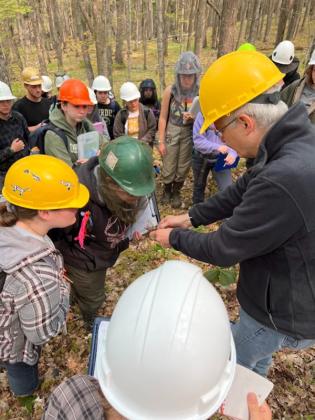By Vicki Browne
Iron County Lakes & Streams Partnership
IRON RIVER — Spring 2023 marks the 32nd anniversary of Purdue University’s Department of Forestry and Natural Resources summer practicum at Covenant Point Bible Camp on Hagerman Lake. For five weeks each spring Purdue students, teachers’ assistants and professors live and study in and around CPBC. They arrived on May 7 and will be doing field work at various locations until June 10.
The 80 students all learn land navigation, surveying and management skills during their first week onsite. For the remaining four weeks, they study in their specific areas.
Aquatic sciences students learn about testing water quality, sampling macroinvertebrate (like dragonfly larvae and snails) and assessing fish populations. They spend a lot of time on the water at Hagerman, Bass and Ottawa lakes. They visit different hatcheries and research sites including the Michigan Department of Natural Resources hatchery in Marquette and Les Voigt Fish Hatchery outside Bayfield, Wisconsin. Both sites raise various trout species.
The aquatic sciences students presented an ecological health assessment of the Iron River at the Windsor Center on Friday, May 19. The audience contained mostly fishermen; the students presenting on the fisheries were mostly fisherwomen.
Their week’s work involved testing water quality, sampling macroinvertebrates, and surveying fish species in three tributaries of the Iron River. The students were guided by Purdue faculty and members of the Fred Warra Chapter of Trout Unlimited. Several audience members commented on how knowledgeable, confident and enthusiastic the students were.
Forestry students with the program learn how to survey and inventory forests. They also learn about GIS/GPS, silviculture (controlling the growth and quality of forests to meet timber production needs), and forest products. They visit sites in the Ottawa and Nicolet national forests to see different habitats and old-growth forests. They visit Shamco to see sustainable logging operations, J.W. Toumey Nursery to learn about tree seedlings, and Lyme Great Lakes Timberlands which is a 677,000-acre privately-owned forest spanning areas of Wisconsin and Michigan.
Wildlife ecology students learn about habitat management, trapping and tracking mammals, capturing and handling birds, and sampling and monitoring amphibians and reptiles. Their work is done around Covenant Point and at locations in the Ottawa National Forest.
“They get lots of hands-on experience with wildlife.” said Laura Fehling, summer practicum coordinator for Purdue.
Iron County’s lakes, streams and forests are wilderness classrooms that extend Purdue’s campus into the U.P. for genuine Yooper hospitality. CPBC staff provide a home away from home, while local businesses and organizations extend educational opportunities.
Camp staff provide lodging, breakfast and dinner onsite, sack lunches for students working offsite, an optional daily devotional, and access to activities and games.
From 7 a.m. to 6 p.m. students are engaged in field trips, coursework, tests and chores. When the work is done, they can enjoy playing frisbee or volleyball, kayaking, taking a chilly swim in the lake, or head into town.
Erik Strom, executive director and pastor at CPBC, said camp staff enjoy getting to know the students.
“The relationship between Purdue and Covenant Point is mutually beneficial,” Strom said. “We have grown together by responding to each others’ needs.”
Purdue’s Department of Forestry and Natural Resources offers courses of study in forestry, wildlife ecology and aquatic sciences with the mission to be “a world leader in natural resource sciences.” The summer practicum is one of three offered by the department, but is the only one that encompasses all three areas of study. It is a required course that usually follows the student’s sophomore year.
CPBC was established in 1926 by the Young People’s Conference of Covenant Church. CPBC is a year-round camp with various opportunities and outings for school-aged children, families and individuals. According to its website, “Campers and guests come from diverse backgrounds, yet for each, we seek to provide opportunities to grow in wholeness: spiritually, emotionally, physically and relationally.”
The Purdue summer practicum moved to CPBC in 1991 when the University of Michigan’s forestry camp, Camp Filibert Roth, on Golden Lake was no longer available.
More information about Purdue’s Forestry and Natural Resources Program is available at ag.purdue.edu/department/fnr. More information about CPBC is available at cpbc.com.
Purdue marks 32 years at CPBC
Image
Body


